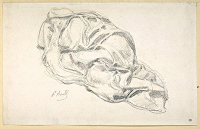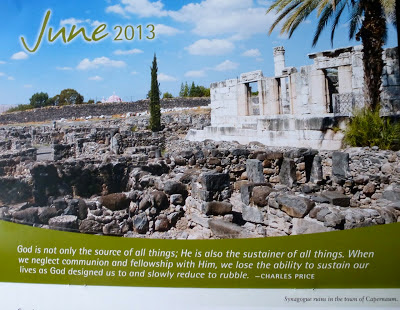TO CHEW ON: "'Woe to you, scribes and Pharisees, hypocrites! For you are like graves which are not seen, and the men who walk over them are not aware of them'" - Luke 11:44
My Bible's footnote explains the cultural context of this macabre picture:
"Since stepping on a grave was defiling to a Jew (Numbers 19:16) unmarked graves were a menace. Usually tombs were whitewashed in order to identify them (see Matthew 23:27). The attractive outward display of religion concealed the deadness within the hearts of the hypocrites" - J. Lyle Story, commentary on Luke, New Spirit-Filled Bible, p. 1412.
What Jesus was saying, in effect, was that people who allowed themselves to come under the teaching and authority of the scribes and Pharisees were exposing themselves to defilement. Ouch! No wonder these religious leaders "… began to assail Him vehemently, and to cross-examine Him … lying in wait … seeking to catch Him … that they might accuse Him (Luke 11:53, 54).
We would never be guilty of such a thing as these scribes and Pharisees were, would we? But we often are, maintains Michael D. Sedler, author of Stopping Words that Hurt. His thesis is that we defile our listeners when we gossip and say slanderous, hurtful things about others. But he goes even further, insisting that we contribute to our own defilement when we so much as stand by as silent listeners to such words. Here's a bit from his introduction:
"The Bible refers to negative comments or stories regarding other people as 'evil reports' …. A careful search through the Scriptures shows that our gossip and truth stretching … carries with it far-reaching ramifications that affect not only the life of the speaker but the life of the listener …. It is not only 'speaking evil' that fosters sin in our lives, listening to evil reports defiles our spirits and creates a wedge between friends, family and colleagues" - Michael D. Sedler, Stopping Words that Hurt, Kindle Location 42.
Let's be on guard about letting our mouths, or our ears, become unmarked graves of defilement to others and ourselves!
PRAYER: Dear Jesus, what a sobering thought—that I might be the cause of someone else's defilement. Please help me to guard my mouth and my ears against giving and hearing 'evil reports' about others. Amen.
***********
The Holy Bible, New King James Version Copyright © 1982 by Thomas Nelson, Inc. - Used with permission.


















